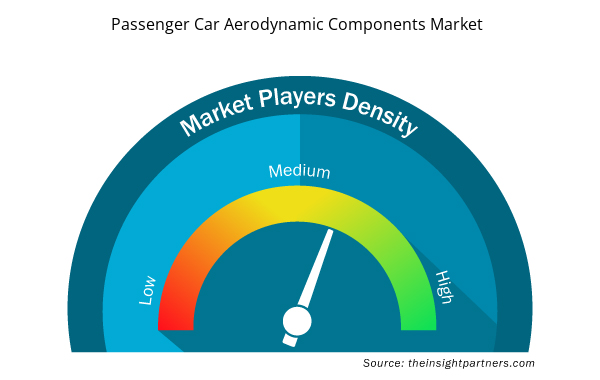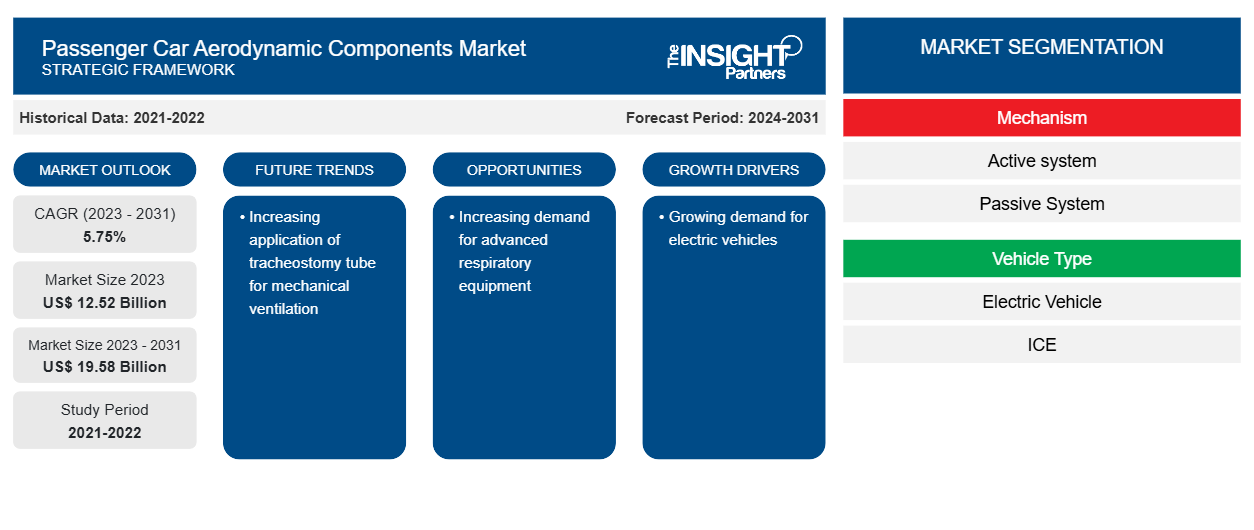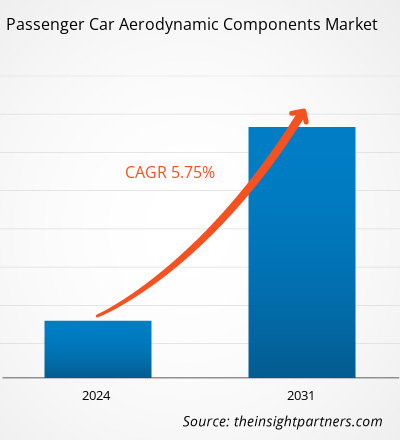乘用车空气动力学部件市场规模预计将从 2023 年的 125.2 亿美元增至 2031 年的 195.8 亿美元。预计 2023-2031 年市场复合年增长率将达到5.75 %。电动汽车的空气动力学性能对车辆的经济性、动力性能、操纵稳定性和乘坐舒适度有很大影响。因此,汽车制造商正专注于电动汽车的空气动力学措施,从而推动乘用车空气动力学部件市场的发展。
乘用车空气动力部件市场分析
欧洲为汽车制造商设定了减少二氧化碳排放的积极目标。到 2021 年,欧洲汽车的平均排放必须达到每辆车 95 克/公里 (g/km)。在大多数 OEM 厂商于 2015 年稳稳实现 130g/km 的目标后,预计到 2021 年实现新的 95g/km 目标将更加困难,主要是如果汽车制造商继续以 2008-2014 年期间的速度前进的话。如果日产、沃尔沃、丰田和标致雪铁龙集团 能以身作则,那么现代、通用、菲亚特和本田等汽车制造商必须快速适应混合动力或柴油动力系统组合,以符合二氧化碳减排要求,在 2025 年前实现目标。由于必须达到政府制定的排放法规,汽车制造商预计将严重依赖更高效的空气动力学设计来最大限度地减少阻力和减少碳排放。
乘用车空气动力部件市场概况
空气动力学在定义车辆从燃油汽车到电动汽车的范围方面发挥着重要作用。因为它直接影响车辆用于克服空气阻力的能量。GFEI (全球燃料经济倡议)推出了各种政策,各国可以据此努力提高燃油经济性。发动机、动力系统 和空气动力学是提高燃油经济性的重要因素。此外,转向替代燃料来源(例如推广零排放和电动汽车)是提高燃油经济性的举措。因此,对燃油经济性的日益关注可能会推动空气动力学部件市场的发展。
定制此报告以满足您的需求
您可以免费定制任何报告,包括本报告的部分内容、国家级分析、Excel 数据包,以及为初创企业和大学提供优惠和折扣
- 获取此报告的关键市场趋势。这个免费样品将包括数据分析,从市场趋势到估计和预测。
乘用车空气动力学部件市场驱动因素和机遇
电动汽车需求不断增长
空气阻力或风阻被认为是汽车设计中首要考虑的问题。其他重要问题是汽车重量和燃油效率。特别是 21 世纪,汽车设计在空气动力学问题方面得到了改进。值得注意的是,阻力减少一个数值,即ACD = 0.1,意味着油耗提高 2.60 公里/升。
能源部 (DOE) 提供的统计数据也值得一提,美国生产的能源中有 16% 用于克服道路车辆的阻力。全球情况也类似。因此,改善汽车的空气动力学性能以节约日益枯竭的石油储备具有巨大的空间。汽车的空气动力学设计至关重要,因为它无疑会影响行驶中的稳定性和燃油经济性。因此,必须清楚地了解乘用车的外部空气动力学,它们更接近钝体,由于其非线性和随机性,其上的流动非常复杂。此外,汽车行业的全球竞争水平不断提高。车辆设计和内容复杂性的增加导致开发过程耗时且昂贵。高成本和漫长的酝酿期对汽车制造商来说意味着显著的风险。相反,很明显,技术将作为全球竞争的基础发挥越来越重要的作用,需要使用安全、设计和制造经济的高质量产品。
为经济型车辆开发主动空气动力学系统
适用于 A/B、C 和 D 级经济型轿车的主动空气动力学系统预计将为市场增长带来巨大机会。主动空气动力学系统的实施成本明显高于被动系统。然而,主动系统的优势抵消了经济型轿车中被动系统的实用性。经济型轿车中的被动系统可以提供更好的操控性,但会降低燃油经济性;也可以提供更好的燃油经济性,但会降低驾驶动力。例如,C 级车辆的后扰流板可以提供更好的操控性和驾驶动力,但由于扰流板产生的下压力,会降低燃油经济性。然而,使用主动后扰流板,车辆可以提供更好的燃油经济性和更好的操控性,以满足驾驶条件。因此,开发具有成本效益的主动空气动力学系统预计将为空气动力学部件市场提供广泛的机会。
乘用车空气动力部件市场报告细分分析
有助于得出乘用车空气动力学部件市场分析的关键部分是机制、车辆类型和应用。
- 根据机制,乘用车空气动力部件市场分为主动系统、被动系统。被动系统部分在 2023 年占据了较大的市场份额。
- 根据车型,乘用车空气动力学部件市场分为电动汽车和内燃机汽车。内燃机汽车在 2023 年占据了最大的市场份额。
- 根据应用,乘用车空气动力学部件市场分为气坝、扩散器、间隙整流罩、格栅百叶窗、侧裙、扰流板、前分离器。扰流板部分在 2023 年占据了更大的市场份额。
乘用车空气动力部件市场地域分析
乘用车空气动力部件市场报告的地理范围主要分为五个区域:北美、欧洲、亚太、中东和非洲、南美。
乘用车空气动力学部件市场大致分为五大区域——北美、欧洲、亚太地区、中东和非洲以及南美。欧洲汽车行业聚集了众多知名汽车制造商,包括大众集团、宝马汽车公司、斯柯达汽车公司、奥迪汽车公司和保时捷汽车公司等。欧洲地区不同国家的经济增长推动了乘用车、跑车和商用车的需求,从而迫使汽车制造商在一段时间内增加产量。预计成熟的欧洲市场将在预测期内提供丰厚的增长机会。
乘用车空气动力学部件市场区域洞察
Insight Partners 的分析师已详尽解释了预测期内影响乘用车空气动力学部件市场的区域趋势和因素。本节还讨论了北美、欧洲、亚太地区、中东和非洲以及南美和中美洲的乘用车空气动力学部件市场细分和地理位置。

- 获取乘用车空气动力学部件市场的区域特定数据
乘用车空气动力学部件市场报告范围
| 报告属性 | 细节 |
|---|---|
| 2023 年的市场规模 | 125.2亿美元 |
| 2031 年市场规模 | 195.8亿美元 |
| 全球复合年增长率(2023 - 2031) | 5.75% |
| 史料 | 2021-2022 |
| 预测期 | 2024-2031 |
| 涵盖的领域 | 按机制
|
| 覆盖地区和国家 | 北美
|
| 市场领导者和主要公司简介 |
|
乘用车空气动力学部件市场参与者密度:了解其对业务动态的影响
乘用车空气动力学部件市场正在快速增长,这得益于终端用户需求的不断增长,这些需求源于消费者偏好的不断变化、技术进步以及对产品优势的认识不断提高等因素。随着需求的增加,企业正在扩大其产品范围,进行创新以满足消费者的需求,并利用新兴趋势,从而进一步推动市场增长。
市场参与者密度是指在特定市场或行业内运营的企业或公司的分布情况。它表明在给定市场空间中,相对于其规模或总市场价值,有多少竞争对手(市场参与者)存在。
在乘用车空气动力学部件市场运营的主要公司有:
- 普拉斯曼集团
- 法雷奥
- 麦格纳国际公司
- HBPO 有限公司
- 劳士领集团
免责声明:上面列出的公司没有按照任何特定顺序排列。

- 获取乘用车空气动力学部件市场顶级关键参与者概览
乘用车空气动力学部件市场新闻和最新发展
乘用车空气动力学部件市场通过收集一手和二手研究后的定性和定量数据进行评估,其中包括重要的公司出版物、协会数据和数据库。以下是乘用车空气动力学部件市场的发展和战略列表:
- 2024 年 1 月,现代汽车公司和起亚公司推出了“主动空气裙”(AAS)技术,该技术可最大限度地减少高速行驶时产生的空气阻力,有效提高电动汽车(EV)的续航里程和行驶稳定性。(来源:现代汽车,新闻稿/公司网站/时事通讯)
乘用车空气动力学部件市场报告范围和交付成果
“乘用车空气动力学部件市场规模和预测(2021-2031)”报告对以下领域进行了详细的市场分析:
- 范围内所有主要细分市场的全球、区域和国家层面的市场规模和预测
- 市场动态,如驱动因素、限制因素和关键机遇
- 未来的主要趋势
- 详细的波特五力分析
- 全球和区域市场分析涵盖关键市场趋势、主要参与者、法规和最新市场发展
- 行业格局和竞争分析,涵盖市场集中度、热点图分析、知名参与者和最新发展
- 带有 SWOT 分析的详细公司简介
- 历史分析(2 年)、基准年、预测(7 年)及复合年增长率
- PEST 和 SWOT 分析
- 市场规模价值/数量 - 全球、区域、国家
- 行业和竞争格局
- Excel 数据集



Report Coverage
Revenue forecast, Company Analysis, Industry landscape, Growth factors, and Trends

Segment Covered
This text is related
to segments covered.

Regional Scope
North America, Europe, Asia Pacific, Middle East & Africa, South & Central America

Country Scope
This text is related
to country scope.
Trends and growth analysis reports related to Automotive and Transportation : READ MORE..
The Insight Partners performs research in 4 major stages: Data Collection & Secondary Research, Primary Research, Data Analysis and Data Triangulation & Final Review.
- Data Collection and Secondary Research:
As a market research and consulting firm operating from a decade, we have published and advised several client across the globe. First step for any study will start with an assessment of currently available data and insights from existing reports. Further, historical and current market information is collected from Investor Presentations, Annual Reports, SEC Filings, etc., and other information related to company’s performance and market positioning are gathered from Paid Databases (Factiva, Hoovers, and Reuters) and various other publications available in public domain.
Several associations trade associates, technical forums, institutes, societies and organization are accessed to gain technical as well as market related insights through their publications such as research papers, blogs and press releases related to the studies are referred to get cues about the market. Further, white papers, journals, magazines, and other news articles published in last 3 years are scrutinized and analyzed to understand the current market trends.
- Primary Research:
The primarily interview analysis comprise of data obtained from industry participants interview and answers to survey questions gathered by in-house primary team.
For primary research, interviews are conducted with industry experts/CEOs/Marketing Managers/VPs/Subject Matter Experts from both demand and supply side to get a 360-degree view of the market. The primary team conducts several interviews based on the complexity of the markets to understand the various market trends and dynamics which makes research more credible and precise.
A typical research interview fulfils the following functions:
- Provides first-hand information on the market size, market trends, growth trends, competitive landscape, and outlook
- Validates and strengthens in-house secondary research findings
- Develops the analysis team’s expertise and market understanding
Primary research involves email interactions and telephone interviews for each market, category, segment, and sub-segment across geographies. The participants who typically take part in such a process include, but are not limited to:
- Industry participants: VPs, business development managers, market intelligence managers and national sales managers
- Outside experts: Valuation experts, research analysts and key opinion leaders specializing in the electronics and semiconductor industry.
Below is the breakup of our primary respondents by company, designation, and region:

Once we receive the confirmation from primary research sources or primary respondents, we finalize the base year market estimation and forecast the data as per the macroeconomic and microeconomic factors assessed during data collection.
- Data Analysis:
Once data is validated through both secondary as well as primary respondents, we finalize the market estimations by hypothesis formulation and factor analysis at regional and country level.
- Macro-Economic Factor Analysis:
We analyse macroeconomic indicators such the gross domestic product (GDP), increase in the demand for goods and services across industries, technological advancement, regional economic growth, governmental policies, the influence of COVID-19, PEST analysis, and other aspects. This analysis aids in setting benchmarks for various nations/regions and approximating market splits. Additionally, the general trend of the aforementioned components aid in determining the market's development possibilities.
- Country Level Data:
Various factors that are especially aligned to the country are taken into account to determine the market size for a certain area and country, including the presence of vendors, such as headquarters and offices, the country's GDP, demand patterns, and industry growth. To comprehend the market dynamics for the nation, a number of growth variables, inhibitors, application areas, and current market trends are researched. The aforementioned elements aid in determining the country's overall market's growth potential.
- Company Profile:
The “Table of Contents” is formulated by listing and analyzing more than 25 - 30 companies operating in the market ecosystem across geographies. However, we profile only 10 companies as a standard practice in our syndicate reports. These 10 companies comprise leading, emerging, and regional players. Nonetheless, our analysis is not restricted to the 10 listed companies, we also analyze other companies present in the market to develop a holistic view and understand the prevailing trends. The “Company Profiles” section in the report covers key facts, business description, products & services, financial information, SWOT analysis, and key developments. The financial information presented is extracted from the annual reports and official documents of the publicly listed companies. Upon collecting the information for the sections of respective companies, we verify them via various primary sources and then compile the data in respective company profiles. The company level information helps us in deriving the base number as well as in forecasting the market size.
- Developing Base Number:
Aggregation of sales statistics (2020-2022) and macro-economic factor, and other secondary and primary research insights are utilized to arrive at base number and related market shares for 2022. The data gaps are identified in this step and relevant market data is analyzed, collected from paid primary interviews or databases. On finalizing the base year market size, forecasts are developed on the basis of macro-economic, industry and market growth factors and company level analysis.
- Data Triangulation and Final Review:
The market findings and base year market size calculations are validated from supply as well as demand side. Demand side validations are based on macro-economic factor analysis and benchmarks for respective regions and countries. In case of supply side validations, revenues of major companies are estimated (in case not available) based on industry benchmark, approximate number of employees, product portfolio, and primary interviews revenues are gathered. Further revenue from target product/service segment is assessed to avoid overshooting of market statistics. In case of heavy deviations between supply and demand side values, all thes steps are repeated to achieve synchronization.
We follow an iterative model, wherein we share our research findings with Subject Matter Experts (SME’s) and Key Opinion Leaders (KOLs) until consensus view of the market is not formulated – this model negates any drastic deviation in the opinions of experts. Only validated and universally acceptable research findings are quoted in our reports.
We have important check points that we use to validate our research findings – which we call – data triangulation, where we validate the information, we generate from secondary sources with primary interviews and then we re-validate with our internal data bases and Subject matter experts. This comprehensive model enables us to deliver high quality, reliable data in shortest possible time.


 获取此报告的免费样本
获取此报告的免费样本